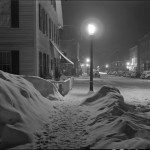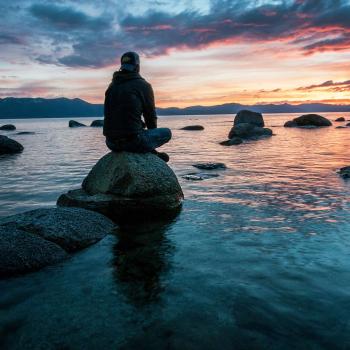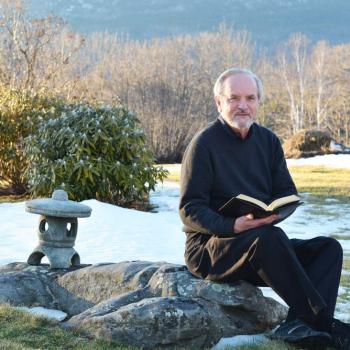Arctic air. Sleet and snow. Black ice. Commuting nightmares. It has been one brutal winter in most of the United States and I, for one, have had enough. This year, like most, when the calendar hit January 2, I was officially ready for summer. But after one of the coldest months on record, even the promise of spring seems far away.
I suppose I could be one of the millions who suffer from Seasonal Affective Disorder (SAD). It’s what some call the winter blues, a seasonal depression that can sap your energy, make you feel cranky and give you a serious case of the blahs. It is estimated it has a severe impact on four to six percent of the population, while another 10 to 20 percent are said to suffer from milder cases of SAD.
Yet some have a different perspective of these blue periods and see them not as a time of darkness–but as an opportunity for spiritual growth.
When the 16th-century Roman Catholic mystic Saint John of the Cross was imprisoned for not obeying a church order, he used this darkest moment of his life to pen the book Dark Night of the Soul. As hinted at by the book’s title, John’s incarceration was hellish and included regular beatings and solitary confinement. But he saw it as the “start of a journey that will lead to the blessed place of perfection”, one in which there would be a divine union between his soul and God.
It’s hard to imagine such a divine union when one is trying to stay afloat in a sea of seasonal depression. During these times it can seem as if God has disappeared, leaving us to fend for ourselves. The religious scholar Mirabai Starr, in her new translation of Dark Night of the Soul, describes this state of mind vividly:
The soul is left baffled and bereft. The soul sits helpless…and simply breathes into the darkness. There is nothing else to do. The seeker in this state may be shy about disclosing his inner struggle to anyone for fear it will reveal nothing but his own deadly doubts and spiritual failures.
So what do you do when you feel like a spiritual loser, abandoned by the divine spirit, left to fight off the bullying emotions of doubt and despair all by yourself? Starr says there is really only one course of action:
All the seeker can do is surrender to the darkness and take humble refuge in the ineffable stillness….we have nowhere to go but into the silence.
It is here in the silence that Starr believes “the divine reality secretly reveals itself to a consciousness cleared of the ongoing chatter of the false self”. She writes that we must be fully present in “the tender, wounded emptiness of our own souls” and that means not hiding from or ignoring the darkness (even though this may be our natural instinct) but facing it head on.
It’s about not turning away from the pain but learning to rest in it. Rather than distracting ourselves from the simple darkness at our core, we sit with it, paying close attention, and opening our hearts to all that is left, which is love.
Sage advice on living with the symptoms of seasonal depression can also be found in the words of Thomas Moore from his book Dark Nights of the Soul, A Guide to Finding Your Way through Life’s Ordeals. Moore advises us that the best way to proceed is not to fight the depression, but instead to “live in, and with, the darkness”:
Go with developments, rather than against them. If you feel empty, empty out your life where it needs it. If you feel sad, let sadness be your dominant feeling. Being in tune with your deep mood is a way of clarifying yourself. Speak for it. Show it. Honor it.
Moore argues that when feeling these extended periods of sadness, it is best not to treat them with pharmaceuticals. And I agree that, unless one is clinically and chronically depressed, it is best to ride out these periods as best you can, especially when the symptoms of SAD can be mitigated through exercise, proper sleep and diet, meditation and prayer. Moore warns:
Ours is still a therapeutic society that values the removal of symptoms over the soul’s sparkle and shine…broaden your imagination of what is happening to you. If you’re only idea is that you’re depressed, you will be at the mercy of the depression industry, which will treat you as one among millions, for whom there is only one approved story.
The dark night is a time for soul work, for digging deep into the self, and in Moore’s words discovering “what it is to live religiously”. The author explains what happens during this period, when you experience the world from the point-of-view of the soul:
It is the deep, dark discovery of roots and cellars, the opposite of enlightenment, but equally important and equally divine…letting your spark light up a dark and dangerous world is a way of healing both you and your world.
Much like Saint John of the Cross, Mirabai Starr also sees the darkness as an opportunity to strengthen our relationship with God. She advises us to “stop and touch down with the stillness that is your true nature, which is God’s true nature, which is love”. She writes that through this action:
God will whisper to the soul in the depth of darkness and guide it through the wilderness of the unknown until it is annihilated in the flames of perfect love.
Moore sees the dark nights as indispensible to our spiritual growth. While he recognizes the difficulties and challenges they pose, he believes the darkness can add “character and color and capacity” to our lives, and are a gift to be appreciated. He writes:
Nothing could be more precious then, than a dark night of the soul, the very darkness of which allows your lunar light to shine. It may be painful, discouraging, and challenging, but it is nevertheless an important revelation of what your life is about. In that darkness you see things you couldn’t see in the daylight.













